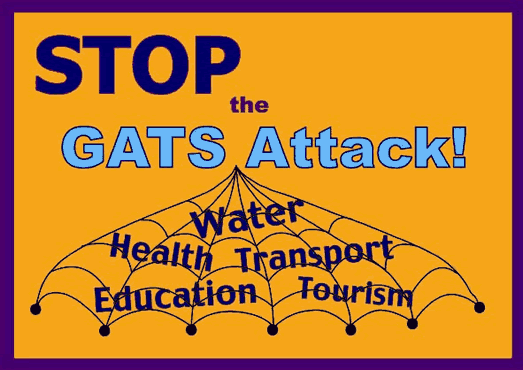Under GATS rules, once a country decides to ‘liberalize’ its electricity or water it cannot put any limits on foreign ownership nor limit how much of the industry one company can own. Also a government is not allowed to favour local businesses, so that if it subsidizes renewable sources of electricity, such as hydroelectricity, and these subsidized sources are mainly owned by local companies, then that could be interpreted as discriminating against foreign service providers that use ‘dirty’ sources of power like oil and gas.
 Also, if services such as health and education are committed to GATS then government subsidies would be seen as giving unfair advantage to local providers. And it is likely that governments would not be able to set price caps on the fees charged for essential services like water and electricity. Governments would therefore lose the ability to ensure that these services were affordable to their poorer citizens (unless sectors of the population are directly subsidized with taxpayer funds, which would be paid to the foreign companies).
Also, if services such as health and education are committed to GATS then government subsidies would be seen as giving unfair advantage to local providers. And it is likely that governments would not be able to set price caps on the fees charged for essential services like water and electricity. Governments would therefore lose the ability to ensure that these services were affordable to their poorer citizens (unless sectors of the population are directly subsidized with taxpayer funds, which would be paid to the foreign companies).
GATS also prevents national governments from putting quantitative limits on services once a service sector has been committed to opening up. So if a government agrees to open up tourism services, for instance, it cannot then limit the number of beach resorts to protect the environment or the atmosphere of an area without being open to challenge under GATS rules.
GATS restrains governments from imposing standards that might hinder free trade in these services. Article VI of the GATS agreement only allows regulations where regulatory objectives are legitimate; the regulation is necessary; and the regulation does not restrict trade more than necessary. Illegitimate regulations might include professional standards, taxation policies, and other policies to achieve objectives such as preserving government services or providing employment.
As a practical matter, this means nations will have to shape laws protecting the air you breathe, the trains you travel in and the food you chew by picking not the best or safest means for the nation, but the cheapest methods for foreign investors and merchants.
Attempts within the WTO to establish a list of legitimate objectives for regulations has proven difficult. GATS requires that domestic regulations such as environmental regulations should be developed in accordance with international standards and this is one criteria against which necessity would be measured. That is, if regulations accord with international standards they would meet the necessity test.
The Indonesian government says it is committed to liberalizing its education sector ‘despite protests form local university rectors’ whose universities would have to compete with foreign universities that would be allowed to set up in Indonesia. The rectors argue that ‘Universities are not a business commodity that can be liberalized in such a way. Apart from the task of transferring and developing knowledge and the sciences, they also have the task of maintaining and developing the nation.’ However the Minister of trade, Mari Elka Pangestu, who is also an economist at the Centre for Strategic and International Studies, and has been a WTO negotiator, argues that competition will be phased in over time.